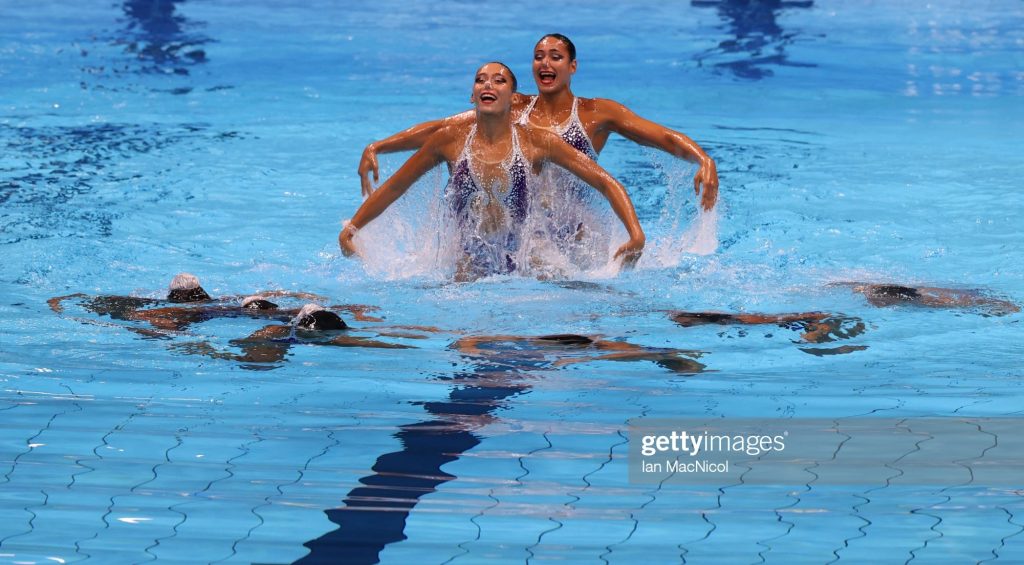
A group of graceful swimmers performs artistic swimming routines in a pool at least three meters deep; their moves, synchronized with the music, are fluid, strong and fierce. Making progress in the last two decades, they’ve come to represent Egypt in the Olympic Games.
Egyptian Streets spoke to the coaches of the National Artistic Swimming team to learn more about their experience in the Tokyo 2020 Olympics. We start with Nour El-Afandi, coach and Manager of the team and former Olympian who took part in the London 2012 Games, who recalls the team’s incredible journey to Tokyo. The interview is then followed by Anastasiya Chepak, former member of the Ukrainian team and the coach and choreographer for the National Artistic Swimming Team since 2014.
Nour, how do you choose the line0up for the National Artistic Swimming Team?
N: The technical committee for artistic swimming at the Egyptian Swimming Federation (ESF) usually designs try-outs to choose new members for the national team which consists of nine girls. Then, sporting clubs sent the names of their nominees for our first national team. It takes many phases to settle on a final selection, which depends on many factors, like flexibility, core strength, and more.
Egypt’s artistic swimming team is the only Arab team participating in the Olympic Games Tokyo 2020, tell us more about the journey to reach this place?
N: I definitely feel proud to be the only Arab team, and to represent Egyptians and Arab women at the Olympics. We were 17th in the free routine and 16th in the technical routine in the Federation Internationale de Natation (FINA) World Championships in 2019 in Gwangju, South Korea. These places qualified us to take part in Tokyo 2020. Since then, we were training on a daily basis until the COVID-19 outbreak.
We then shifted to online training through the first stage of the pandemic, and it was a very hard period, as artistic swimming is not an individual sport, and the training needs to be done in person. We were able to resume our normal training back in September.
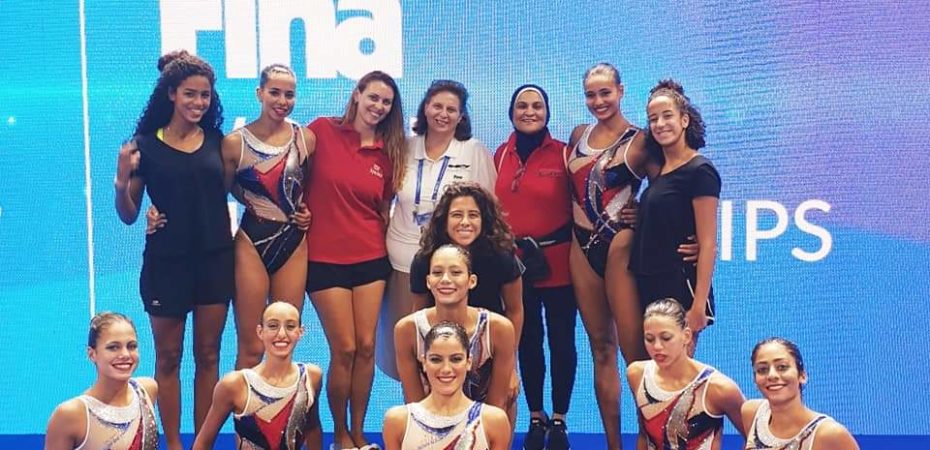
What was the biggest challenge you faced in Tokyo?
N: We arrived at the Olympic Village in Tokyo five days ahead of our first performance because of regulations imposed against COVID-19. It was too short a period to get the required training, in addition to a very limited time to train in the pool, so ESF offered the team underwater earphones in order to make our training easier in a very limited time at the Olympic Village; it was actually a brilliant use of technology.
Why is artistic swimming not gaining popularity in Egypt?
N: I do not know why, but it is one of the most difficult sports in the world. The training alone is divided into five parts: swimming, gymnastics, flexibility, endurance, and strength. We spend 10 hours daily, six days a week training hard to perform a four minutes routine and proudly represent our country at the end. It takes a lot of effort.
Incidentally, artistic swimming, previously known as synchronized swimming, started in Egypt in the sixties. Now, Al-Ahly SC and the Shooting Club are definitely the top artistic swimming schools in Egypt, but, lately, many artistic swimming academies have popped up in New Cairo, 6 October City, and in Smouha Sporting Club as well. I’m a partner in one of these academies, and I think the sport has started to gather attention recently, as I see there is a trend of expanding water ballet academies around Egypt’s governorates, with academies in Sharm El-Sheikh searching for water ballet trainers.
What kind of support does the ESF offer to your team?
N: The ESF’s Chairman Yasser Idris is offering unprecedented support to artistic swimming in recent years. The Federation offered a financial reward to the national team members after beating Australia and getting 7th place at the Olympic Games Rio 2016, and a financial reward also awaits our team since we achieved a record score of 80 points in Tokyo 2020.
The Federation also started to engage the team in more international championships; it facilitated our participation in the duet event at the FINA Artistic Swimming World Series 2021 in Barcelona, Spain and another virtual championship held in Canada. We hope to participate more in such kinds of international championships.
What is your goal for the 2024 Olympic Games in Paris?
N: We achieved a great score, so I wish to continue progressing towards Paris 2024. The progress is slow, but we are very keen not to go backwards as to represent Egypt honorably.
Anastasia, you have been training the national team for seven years now. How would you evaluate the team’s progress?
AC: I started training the national team in 2014. I trained the girls on duet and solo performances. In 2017, I became head coach. During this time, we were able to advance three rankings. It wasn’t easy, as we compete once per year, while other teams compete no less than four times. We worked so hard to achieve this score, and I was so keen to create harmony between clean, good, and definite movements, and the music.
In our sport, it is very important to go to many competitions: for girls to get more experience, and for coaches to know what to change and where to improve to get better results.
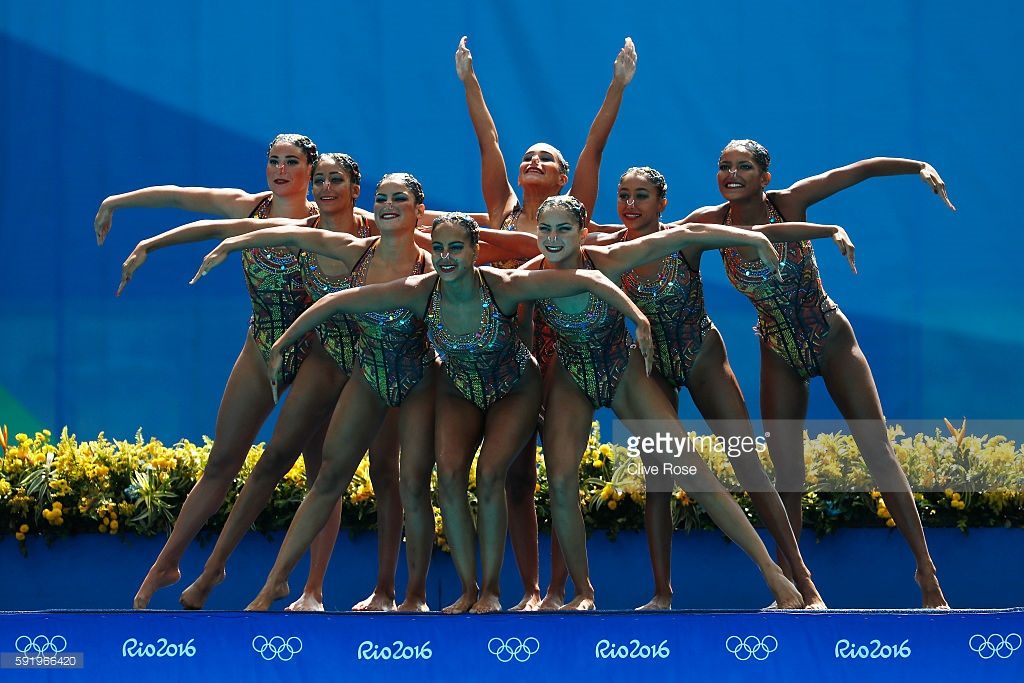
Where does our national team rank on the global map?
AC: Usually we are 17 out of 24-30 countries.
Is it possible to jump to a higher place in the 2024 Paris Olympics?
AC: As I said, it is not easy, because we need more engagement with other international teams continuously. Another challenge is that the girls are so young, and most of them retire by the age of 20-21, and this is one of the factors why Egypt’s team is unable to make a massive progress. In this sport, girls become stronger and more experienced in their twenties. These are the most important factors to achieve a better Olympic score or a medal. Currently, there is only one girl remaining from the team that participated in the Rio Olympics 2016.
Why did you choose to train the Egyptian team? And describe your journey to Egypt 10 years ago.
AC: I was invited by the coach of the Ukrainian national team. Gezira Sporting Club was searching for a coach, and the Ukrainian head coach offered the position to me. I agreed to try for a couple of months, and the journey started there. In general, I consider it a fruitful experience that I love.
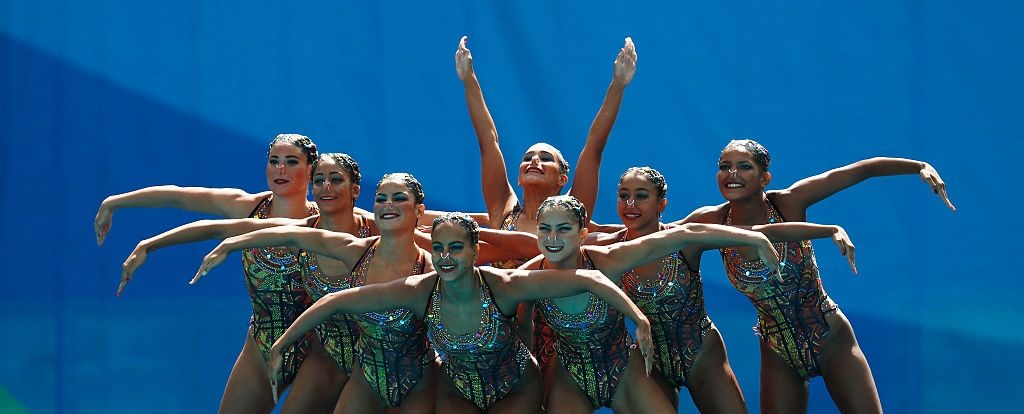



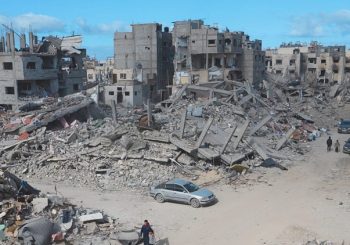


Comments (6)
[…] Source link […]
[…] المصدر by [author_name] كما تَجْدَرُ الأشارة بأن الموضوع الأصلي قد […]